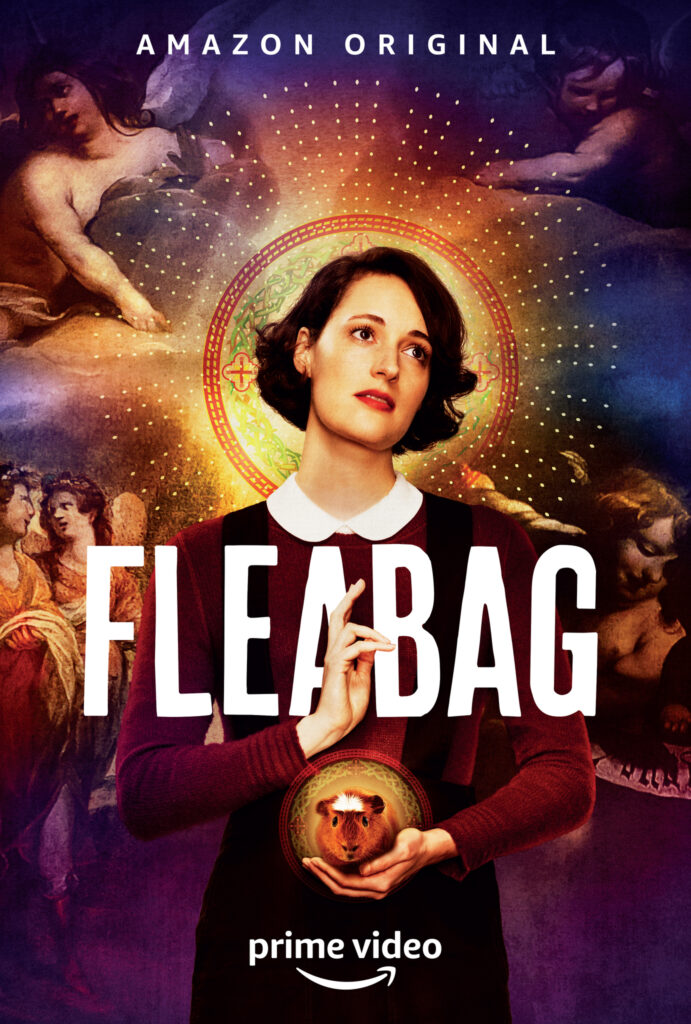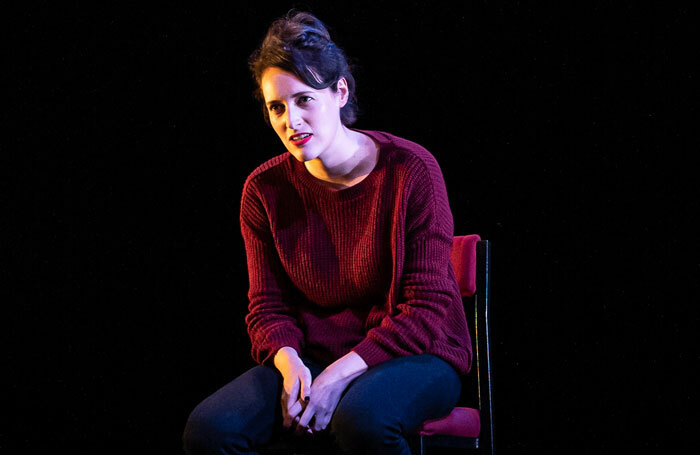A must-watch for anyone who enjoys laughing through their pain and wishes to relate to a very unstable character

Review by Mariana Gutierrez-Serna
One of my best friends, Laura, suggested I watch the series Fleabag, since the protagonist reminded her of me: a confused, sexually driven, ill-mannered, a little unstable, single, brown curly-haired woman.
Normally this would have offended me, but I thought to myself “why not get a laugh out of this?”, so I gave in to her suggestion. I committed to spending two hours and a half watching six 22-minute-long episodes of this apparently well-recognized show.
Fleabag is a British series that takes place in modern London, and it follows the story of an open-minded woman who unsuccessfully navigates relationships and her business; a guinea-pig themed café that she is now maintaining all on her own after the passing of her best friend and business partner. As she struggles with her grief, she is unable to ask for help and finds herself unable to rely on anyone.
Phoebe Waller-Bridge created, wrote, and starred in Fleabag, which she based on a one-act play she wrote in 2013. Her one-woman show was designed to be simplistic, and this was transmitted into the TV series, as there was not an elaborated stage. The setting remained secondary to the screenwriting and the character’s journey. After watching a few clips from the live performance of the one-act at the beginning of this year, I had the pleasure of renting Waller-Bridge’s play script. The core storyline of the play is the same as the first season of the series: the protagonist tries to remain in control of her life while she deals with the passing of her best friend.
Waller-Bridge’s interactions with the characters remain as genuine in the series as they were on stage. Throughout the one-act, Waller-Bridge took the role of most of the supporting characters (others were featured as a recorded voice), in addition to portraying the character of Fleabag. As I watched Waller-Bridge have multiple vivid conversations with different people alone on stage, I finally understood what my friend meant when she said this woman’s storytelling skills were underappreciated. These lively personalities were mirrored to perfection in the series by the outstanding cast of Olivia Colman, Brett Gelman, Hugh Skinner, Bill Patterson, amongst other great talents.
Both productions of Fleabag received the same amount of recognition for its use of dark humour through creative dialogue and cringey character interactions as I imagined they would. The first season of the series received the British Screenwriter’s award, as well as the BAFTA award in female performance in a comedy program. The second season seemed to have intensified every good element of the first season, as it received six Emmy awards. Phoebe Waller-Bridge was well deserving of her Outstanding Lead Actress in a Comedy Series award, along with Outstanding writing, directing, casting and comedy series. The Golden Globes were not blinded to the series’ success, awarding Fleabag Best Television Series (Musical or Comedy), and giving Waller-Bride another win as Best Performance by an Actress in a Television Series.
Both the structure of the show and exploration of trauma matches that of a stand-up comedy act, expressing difficult topics through small segments in a hilarious way. Fleabag’s script is raw and genuine. It exemplifies the reality of a character who is unfiltered with others, as well as herself. An important aspect of both the TV series and the play, is that the protagonist remains nameless throughout the storyline. I was oblivious to this fact, not realizing I had gotten to know this woman intimately for a couple of episodes without being aware of her name. My friend had to be the one to point it out to me. And even then, I found it hilarious how I was able to share my thoughts about the show without once mentioning the character’s name.

In an interview with Decider, Waller-Bridge explained how “fleabag” was her family nickname as a child and it is in fact the name of the protagonist. Waller-Bridge chose not to address her character with any specific name other than “she”, “her” or “you” to emphasize her “fleabaggy-ness”. She wanted to reflect how, contrary to what the character reflects, she is a bit of a mess and does not have her life under control.
Aside from Waller-Bridge’s reasoning behind her unnamed character, this element did pull the public deeper into the story. It allowed me to become the nameless protagonist. Since the characters were not addressing anyone by name, it was interesting how I began to feel as if the characters were directly speaking to me.
This show is unpredictable and cleverly imagined. The first 58 seconds of the second episode is a scene that summarizes the nature of the show. Fleabag is seen through an eye level shot sitting between two people on a packed London Underground train. “Sail” by Awolnation starts to play and she looks around at the other passengers, who scream in agony with each beat drop.
Everyone in the scene embodies aggressive and sudden movements with the rhythm of the music. Back to the eye level shot, Fleabag seems unbothered, but confused by what is happening. The passengers continue their silent screams contrasting with Fleabag’s calm concern. At the end of the scene, before the title screen comes on, she looks straight at the camera and says, “I think my period’s coming”.
The state of unease that the rest of the passengers experience during this scene is reflective of the constant mood most of the other characters find themselves in when in Fleabag’s presence. Her reaction conveys her apathetic nature, and just like she copes with every unsettling moment, she makes an exit with a humorous comment to alleviate the pain. And, as someone who is scared to confront any sort of chaotic situation in her life, it is so relieving to see a character use comedy to get herself to avoid them too.
Since Waller-Bridge was so involved in the creation and performance of Fleabag, it is as if I am getting to know her as I am experiencing Fleabag’s humour. They both manipulate awkwardness to their benefit and own each room they step into. Regardless of her title as the main character, her attitude manifests knowing the world revolves around her. Also, the fast-paced transition from breaking the fourth wall to her interactions with other characters is seamless: you feel like you are present in the scene. I was not given a chance to guess what went through her head – I experienced her thoughts as they happened.
Unfortunately, I have to admit that, after watching a couple of episodes of the show, I happened to agree with my friend. There are so many qualities that I possess that I saw reflected in Fleabag’s character. Let’s start with the fact that she seems so easily detached from any sort of relationship. Yes, costing her the opportunity to find love but it is so relieving to find a woman in the media that is not overly obsessed with the idea of coupling up.
I am aware that I probably would benefit from therapy because there is no way that pushing everyone I have ever been interested in is healthy. But I can have fun watching someone else do it too. Also, it is interesting knowing the true mental state Fleabag finds herself in and seeing how confident she tries to come off to everyone else. I believe I am not the only one that has done this, but I have a tendency to hide behind my wittiness and sarcasm whenever I am feeling shitty about myself. Sooner or later, I have a breakdown and cry for an entire evening, which Fleabag does not do often, but I have to release all that stress somehow.
Her narration throughout the show is refreshingly blunt, although at times unreliable. Fleabag directly communicates with the audience how she’s come to realize her past mistakes, but her plan of action remains unchanged. Her rebellious personality is untamed when the situation demands civility, or when given the responsibility to care for someone else’s dilemma she remains apathetic.
In one of the initial scenes, Fleabag finds herself at her father’s doorstep at two in the morning and rants “I have a horrible feeling that I’m a greedy, perverted, selfish, apathetic, cynical, depraved, morally bankrupt woman who can’t even call herself a feminist.” Laura was so annoyed at the fact that I couldn’t stop talking about the irony in their interaction. I thought it was hilarious how smoothly Waller-Bridge structured this scene. She fears she might be selfish but has just disrupted her father’s sleep and stands at his doorstep complaining to him so she can find some peace of mind. It is hard not to see how selfish she is being in that moment.
The structure of her character is a brutal perspective at the nature of humanity’s selfishness and inconsistency. Sadly, we are all so self-involved when we are having a life crisis. I tend to completely ignore everyone else’s problem when I am stressed about something because unfortunately, I believe my problem is life threatening even when it isn’t.
I hate how moments in which I got to see Fleabag being shamelessly direct made me think of the nature of my own interactions. I would not like to consider myself an ill-mannered person, but my mom never misses an opportunity to point out when I’ve become too insensitive. I honestly just see Fleabag as a very honest person and anyone who is brutally straight-forward could definitely relate to her.

Comedic dramas usually have one flaw: the comedy always falls short. Or it is just notoriously forced onto the audience. Or it is just sprinkled in to lighten the mood.
In this case, the protagonist is a funny person, and she imbeds comedy into every element of her life as a result. I remember that when Laura mentioned how there was going to be something to laugh about in every scene, I brushed it off thinking this was an exaggeration. It did not take more than 46 seconds into the first episode for me to let out a chuckle.
Another thing I’ve come to realize is the treatment of the comedic drama written by women and how it remains honest and doesn’t simplify or fall into tropes of female sexuality- Fleabag is a perfect example of this. This is not a show about a woman looking for someone to complete her – it is about her trying to heal. This is not about her redemption, but acceptance of what she has brought onto her life.
Okay, so my friend was right, I ended up loving this show. Rotten Tomatoes’ 100% rating couldn’t have been more accurate.
It is a must-watch for anyone who enjoys laughing through their pain and wishes to relate to a very unstable character. I am now starting the second season and I must say my expectations are high and I am certain I won’t be disappointed.
Seasons 1 and 2 of Fleabag are available for streaming on Amazon Prime

Recent Comments